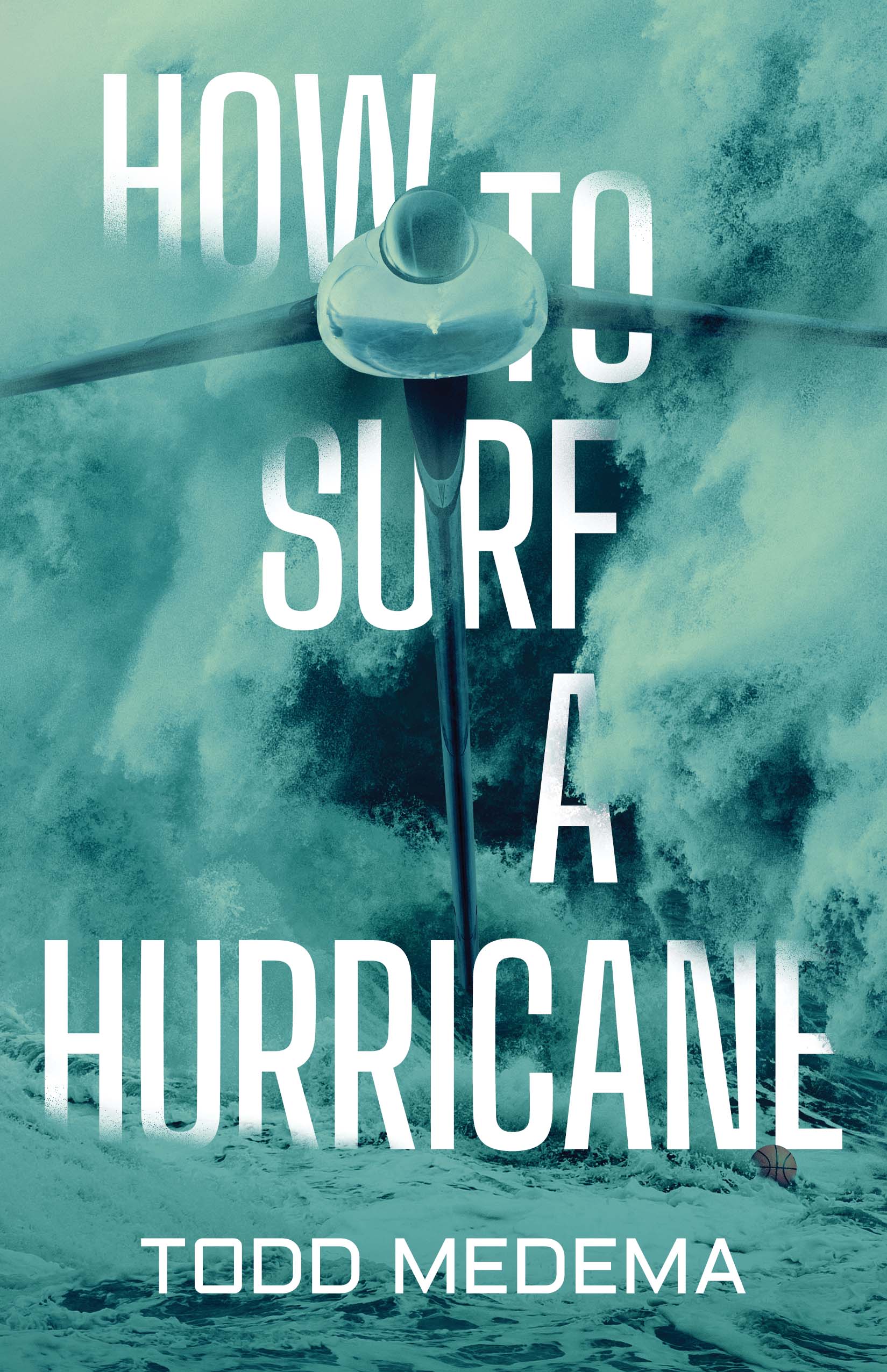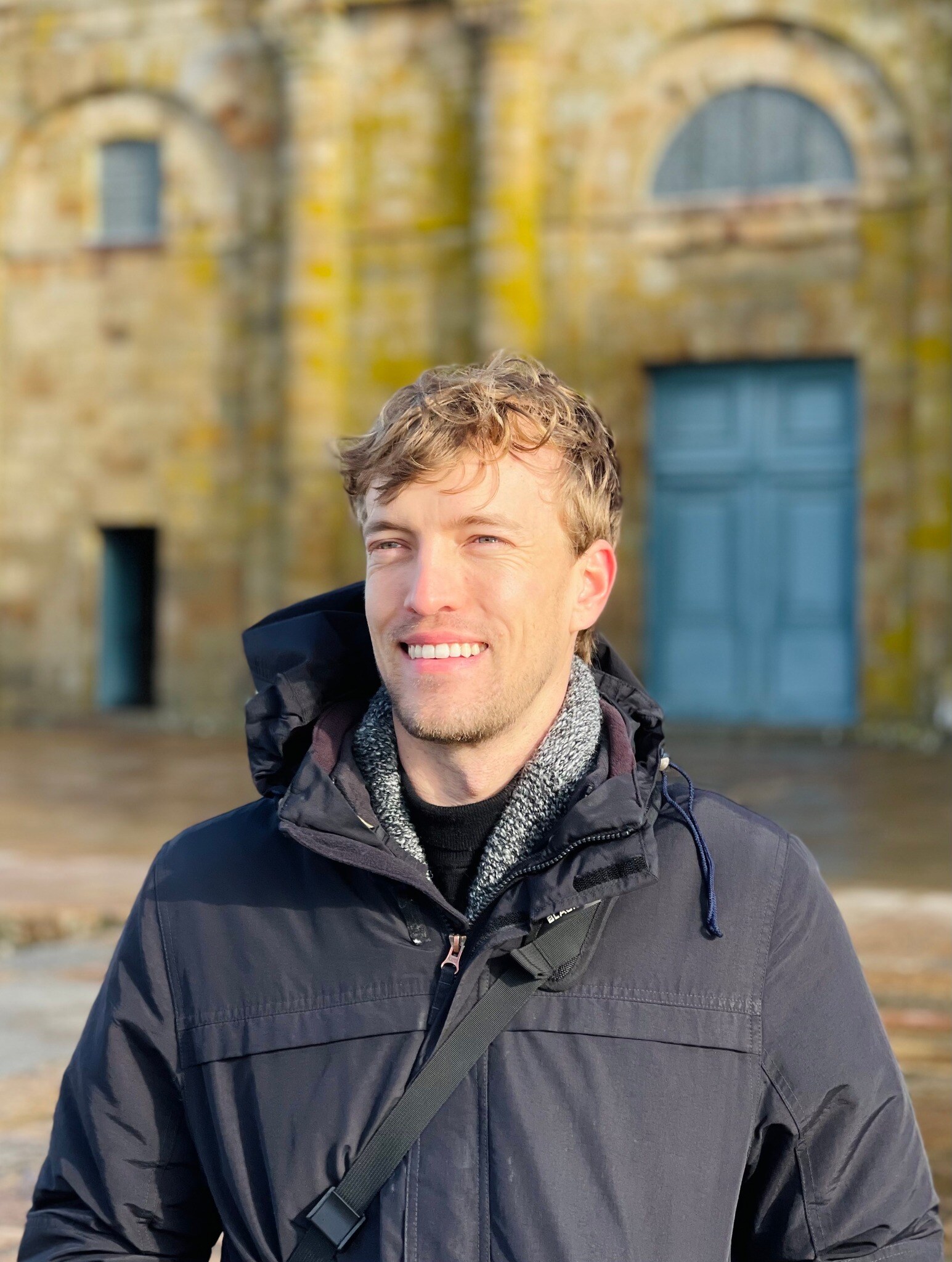Todd Medema’s How to Surf a Hurricane (August 2025) is a story of hope and adapting to climate change—hidden inside an action-packed heist on the high seas. Inspired by the new genre of solarpunk, it tells the story of Moro, an ex-corporate heir, and a globe-spanning ensemble cast fighting for the future—and their friends.
Chat with Todd
Mary: Hello, and welcome to Dragonfly! I love the book cover for your new How to Surf a Hurricane. How did you get to this point; what led you to the creative outlet of writing?
Todd: I’ve dabbled in writing for a long time, writing short stories here and there as inspiration struck. What led me to ultimately commit to and write a novel for the past two years was learning the power of storytelling to inspire and motivate: I came across a research paper showing how much more effective stories are than numbers in changing people’s minds, and I thought to myself, wow, the environmental movement has a numbers problem. We’re always talking about gigatons of CO2, or degrees Celsius, and people’s eyes glaze over. Maybe we need more stories—and not just stories of the consequences, but also stories of action, hope, and inspiration.
Mary: 100% agree that we need stories. What writing communities are you a part of, and how do they help?
Todd: By far the biggest help has been the solarpunk community. I started following #solarpunk on Mastodon, and discovered a whole world of people like me trying to tell stories of hope and adaptation. In a world where social media is flooded with stories of failure and disaster, this community helped keep me inspired, kept reminding me that behind every headline of catastrophe were communities banding together to go outside of the “system,” help each other, and try something new.
Very specific to the craft of writing, I also joined the Critique Circle website very early on, and that was instrumental in getting early feedback that both helped me refine my writing skills and confirm that I was headed in the right direction in crafting an enjoyable and engaging story.
Mary: You might also be interested in the Rewilding Our Stories Discord, which has a big solarpunk presence. How does your book align with nature and place?
Todd: One of my goals with How to Surf a Hurricane was to connect deeply with places around the world to explore how they will change and adapt to the climate. It’s a fast-paced heist, so there are not pages and pages of exposition about these places, but each crew member’s life and story hints at and connects to these deep changes happening around the world. For example, Miki used to work in the Alaskan oil industry until the melting permafrost caused the pipeline to collapse. This is an idea I got when visiting Alaska a few years ago and seeing the immense efforts the oil industry is already going through to keep its pipelines from collapsing.
My first draft of the book had over a hundred footnotes of details like this, then my publisher cautioned that the market wasn’t ready for a hundred footnotes in a heist novel, so I’ve been steadily converting all of my footnotes into a wiki that’s available on the book’s website.
Mary: Does your book have a message, or do you consider it more a piece of art? Or both?
Todd: Well, both, since I believe that all art carries messages. For How to Surf a Hurricane, the message I sought to convey is this: the future will be imperfect, but there is hope. Through individual action, teaming up with our communities, and seeking win-win solutions in harmony with nature, we can craft a better future.
Mary: What’s your greatest experience in nature that somehow profoundly moves your work?
Todd: I find every step into nature profound: every plant, bird, and insect is a reminder that we exist as part of a system that’s so much more complex than us—and has existed for far longer than us. I remember hugging a redwood once that was over a thousand years old and being so humbled by this realization that this single living organism has outlasted entire civilizations, and almost everything humans have ever built. And when it dies, another thousand-year-old tree will grow out of its recycled nutrients. Makes you think: how can we leave that sort of respectful, sustainable legacy on the planet?
Mary: When you were growing up, what was your favorite story?
Todd: My two favorites were Artemis Fowl and the works of Isaac Asimov. I loved Artemis Fowl because it had a character my age and disposition (quiet and nerdy) taking big, meaningful actions in his life. And I love Asimov for how much it made me think about the world, the future, and the many different paths and choices we have. Both taught me that the best science fiction isn’t about technology, it’s a lens for us to explore ourselves.
Perhaps my single favorite story is the Foundation series by Asimov. Thinking about how our choices today will affect humanity hundreds, thousands of years in the future; it’s very humbling to grasp that as a teenager. It really put things in perspective.
Mary: Is there anything else you want to talk about?
Todd: There are a few really profound things I’ve learned from working and volunteering in climate over the years that feel worth sharing:
- There’s no silver bullet, only silver buckshot.
- Protecting our planet is a marathon, not a sprint. It’s okay to pace yourself and take care of yourself.
- History has shown that the ends don’t justify the means. We only win if we all win together.
- Capitalism and consumerism aren’t the only way. Other countries, cultures, and people can teach us a lot about how to live more respectfully, efficiently—and, ultimately, be happier and free.
Mary: Thanks so much, Todd, for your insightful answers and your terrific new novel.
Todd Medema wrote How to Surf a Hurricane because he believes the future doesn’t have to be a dystopia, and he got tired of only reading stories of doom and gloom. He studied Technology, Entrepreneurship, and Design at Carnegie Mellon. After working on self-driving cars and board games, he discovered a passion for clean energy. He spent four years working on the Tesla Megapack battery and now offers Product Management consulting to clean energy companies. Todd spends his free time playing video games, climbing rocks, and gleefully riding his electric bike everywhere. He is currently working on a new novel in the Hurricane universe.

